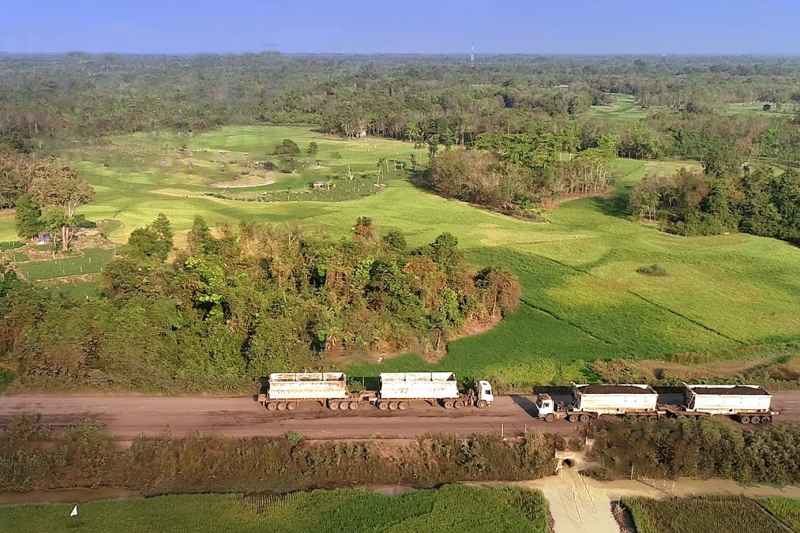The Ministry of Energy and Mineral Resources (ESDM) has confirmed that the selling price of coal for the domestic market or Domestic Market Obligation (DMO) will remain unchanged, despite the Benchmark Coal Price (HBA) for exports being adjusted every two weeks. This decision comes amid the implementation of the new 100% Natural Resource Export Foreign Exchange (DHE SDA) regulation, which takes effect on March 1, 2025. The policy is expected to balance domestic industry interests and national foreign exchange stability.
HBA and DMO: Two Policies Running in Parallel
HBA, which serves as Indonesia’s coal export price benchmark, is regulated under Ministerial Decree (Kepmen) ESDM No. 80.K/MB.01/MEM.B/2025 and Kepmen ESDM No. 72.K/MB.01/MEM.B/2025. These regulations mandate the issuance of the HBA index twice a month, aligning with global market dynamics. However, this policy does not affect DMO prices, which remain fixed at USD 70 per ton for PLN’s coal-fired power plants (PLTU) and USD 90 per ton for other industrial sectors.
Acting Executive Director of the Indonesian Coal Mining Association (APBI), Gita Mahyarani, emphasized that maintaining the DMO price aligns with Ministerial Regulation (Permen) ESDM No. 9/2023. "The DMO price remains unchanged," she confirmed on Sunday (March 2). The USD 70 per ton price for PLN has been in place since 2018 through Government Regulation (PP) No. 08/2018, which revised PP No. 23/2010 on Mineral and Coal Mining Business Activities.
The DMO policy aims to ensure affordable energy supply for domestic industries, particularly PLN, which still relies on coal for 60% of its power generation. However, the fixed pricing has drawn criticism from mining industry players, who argue that rising production costs are putting pressure on their businesses.
Rising Production Costs and Calls for DMO Price Revision
Executive Director of the Indonesia Mining Association (IMA), Hendra Sinadia, stated that the DMO price for the electricity sector urgently needs revision. According to him, production costs have been rising by an average of 5% per year, driven by inflation, increasing overburden removal costs, fuel price hikes, and reliance on imported heavy machinery.
"Mining costs are getting higher, especially for overburden removal and disposal. Additionally, imported components such as heavy equipment and spare parts are impacted by exchange rate fluctuations," Hendra explained. He added that the stagnant DMO price since 2018 has reduced profit margins, particularly for small-scale mines.
Despite industry concerns, the government remains firm on its stance. The ESDM Ministry’s primary argument is maintaining stable energy prices to prevent economic volatility, especially as Indonesia transitions toward renewable energy.
100% DHE SDA: Optimizing Foreign Exchange with Usage Flexibility
Meanwhile, the government has introduced a new policy through PP No. 8 of 2025 on 100% Natural Resource Export Foreign Exchange (DHE SDA), which requires exporters to retain all export earnings in a designated bank account. However, the regulation provides flexibility, allowing companies to use these funds for five strategic purposes:
- Conversion to rupiah at the same bank for operational costs.
- Tax payments and other state obligations in foreign currency.
- Dividend payments in foreign currency.
- Procurement of imported goods/services unavailable domestically.
- Debt repayment for capital goods purchases.
The policy has gained support from industry players, including PT Titan Infra Sejahtera, an energy infrastructure company. Titan sees the 100% DHE regulation as aligning with industry needs while maintaining liquidity. “We support this policy as it provides room for exporters to operate while fulfilling national obligations,” said a Titan representative.
PP No. 8/2025 is seen as a strategic move by the government to strengthen foreign exchange reserves while ensuring export revenues from natural resources are used for productive purposes. Previously, many exporters transferred foreign exchange earnings abroad, potentially weakening the rupiah.
Challenges and Future Expectations
However, implementing 100% DHE SDA comes with risks. The mining association fears that the policy may burden corporate cash flows, particularly for companies with foreign currency debt or those relying on imported equipment. However, the five permitted usage categories are expected to mitigate some of these challenges.
Meanwhile, the pressure to revise the DMO price is expected to persist. If global coal prices remain high while domestic production costs continue to rise, the gap between HBA and DMO could lead to supply imbalances. Analysts suggest the government consider a dynamic pricing formula that accounts for production costs and inflation.
The decision to maintain DMO prices while implementing 100% DHE SDA reflects Indonesia’s balancing act between domestic and global interests. On one hand, low coal prices for PLN and industries help maintain economic competitiveness. On the other, strict foreign exchange regulations aim to preserve national earnings from natural resources.
However, these policies require ongoing evaluation. A fair DMO price revision for mining companies and incentives for increasing production of low-calorie coal (which is more commonly used domestically) could serve as medium-term solutions. Meanwhile, strict oversight of the DHE implementation is crucial to prevent misuse of special foreign exchange accounts.
Through these measures, Indonesia aims to maximize the benefits of its coal resources while safeguarding energy stability and national economic resilience.
 Government Maintains Domestic Coal Prices Amid New 100% Export Foreign Exchange Rule - Titan Infra Sejahtera
Government Maintains Domestic Coal Prices Amid New 100% Export Foreign Exchange Rule - Titan Infra Sejahtera